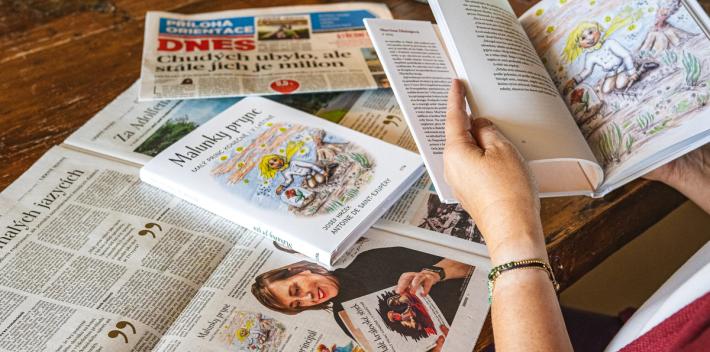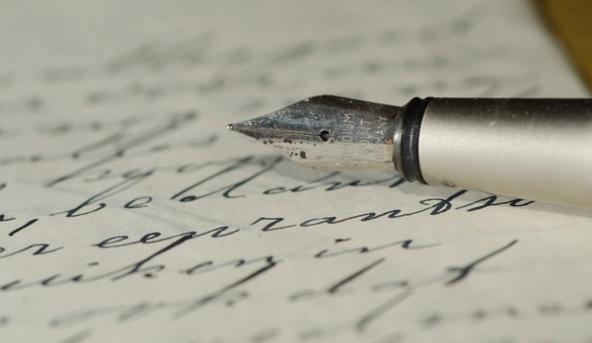
Malunky prync ve víkendové MF DNES
Přečtěte si článek o edici Malého prince v českých a moravských nářečí, za kterými stojí Martina Dlabajová. Vyšel ve víkendové příloze MF DNES - Magazín Víkend DNES.

Projev poslankyně Evropského parlamentu Martiny Dlabajové u příležitosti konání letošního ročníku mezinárodní konference Global Classroom, kde se potkávají studenti z různých zemí světa, aby společně diskutovali a vyměňovali si názory. Tématem letošních studentských diskusí byl „Mír začíná u nás“ (Peace begins with us). Českou republiku na konferenci reprezentovalo Gymnázium Lesní Čtvrť ve Zlíně.
Good morning,
It is a great honour to be here today, as one of the schools present is my alma mater. It’s the gymnasium Zlín, which I have fond memories of - memories of friends and great professional teachers, well some were better than others, but overall it was a great time.
I am an admirer of the Global Classroom Partnership project. I believe that in today’s world, connected through economic and cultural ties like never before, it is important to think globally.
By taking part in this unique exercise, you can learn that you may have more in common with students from different corners of the globe than you might had thought. And that is important, because it is our commonalities that bring us together, and ultimately foster peaceful relations among people.
Which brings me to the topic of this year’s conference and an issue that today, with the war in Ukraine at our doorstep, is of great significance - peace among the nations of the world.
It is impossible not to mention it, the Russian aggression in Ukraine is the largest conflict this continent has seen since World War II. And the EU was quick to respond with sanctions, military and financial aid.
Because peace is the very cornerstone of the European Union. Europe knows from its own experience that peace can only be achieved if aggression is not tolerated under any circumstances and that giving in to those who violate the international order will do nothing but encourage them in their criminal ways.
Today, war between EU member states is almost unthinkable. This is possible not only due to the close economic ties between European countries, but also thanks to the values that the nations of Europe have grown to accept as their commonality: the values of democracy, freedom, peace and most notably the priceless value of human life.
In countless countries throughout the world, and for some of you these may be closer to home than to others, the value of human life is deteriorating or, as is the case with Russia, is non-existent. This is what the EU, the European Parliament and I as an MEP fight against.
Not that long ago, your parents probably still remember it, Europe was a powder keg, always on the edge of exploding.
I remember when we had to do drills in schools, put on gas mask and practice throwing grenades, because the communist regime of Czechoslovakia wanted every civilian to be prepared for a war with the West. A united Europe was nothing more than a distant dream.
Meanwhile in Western Europe, the seeds of what we today call the EU have already begun to take root. In 1952, the European Coal and Steel Community was formed. It created a Single Market for two of the most important resources for war and subjected the two industries under the rule of a supranational authority.
In 1957, with the creation of EURATOM, another important sector for war, the atomic industry, was added to the competences of the common European authority. And for decades to come, as more and more countries joined the European communities, the system remained resilient, and Europe entered an era of peaceful cooperation.
The biggest challenge came with the outbreak of civil war in Yugoslavia in the 1990s. The EU failed to jointly react to the atrocities taking place in its neighbourhood, however it learned from its mistakes.
Today, the EU takes a leading role in peacekeeping operations, conflict prevention and the strengthening of international security all over the world.
For the majority of the 20th century, EU Member States were adamant on keeping their full sovereignty in the fields of foreign relations, security and defence. This changed with the signing of the Maastricht Treaty and the creation of the Common Foreign and Security Policy and the Common Security and Defence Policy.
The EU is the world's largest donor of humanitarian and development assistance and thus has an extensive network of delegations in countries all over the world. In the complicated world of global affairs, the EU has become what we call a normative superpower. This means that in international relations the EU is able to shape conceptions of what is considered normal, and thus can influence others by both directly and indirectly spreading its values.
These values are: democracy, the rule of law and the respect for human rights and fundamental freedoms.
The conditionality principle in development aid, for example, puts pressure on authoritarian regimes to adhere to human rights and democratize, as it only allows funding to countries who follow certain rules.
The European Parliament has gained significant powers since its creation in 1952. Today it can veto international trade agreements between the European Commission and third countries, it organises election observation missions abroad, making sure elections in partner countries are democratic and fair, and it has its own delegations with parliamentary bodies in many countries and international organisations, sharing the necessary know-how on how to uphold democratic processes and serving as the voice of European citizens abroad.
So now you see that the EU is a major player not just in preserving democracy and peace in Europe, but also across the globe.
I hope that you, the new generations who grew up in a long era of peace and stability, will not forget the threat of war. It is a sleeping giant that is best to be not disturbed. Because once he awakes it brings nothing but misery and destruction, and don’t let anyone tell you otherwise.
Thank you.
Martina Dlabajová
Martina Dlabajová podporuje projekt Global Classroom dlouhodobě a studenty zlínského gymnázia přijela povzbudit osobně ještě před konáním konference. Přečtětě si o tom více.